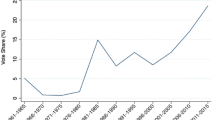Summary.
We consider a model in which parties that differ in perceived valence choose how to allocate electoral promises (money, pork-barrel projects) among voters. The party perceived to be less valent has a greater incentive to “sell out” to a favored minority and completely expropriate a fraction of the electorate. By reducing the difference in perceived valence, campaign-finance regulations may reduce the extent of the expropriation and achieve a more equitable political outcome. We analyze various instruments of campaign-finance regulation from this perspective.
Similar content being viewed by others
Author information
Authors and Affiliations
Corresponding author
Additional information
Received: 20 Februay 2003, Revised: 25 January 2005,
JEL Classification Numbers:
D72, H2.
Nicolas Sahuguet: Correspondence to
We thank Alessandro Lizzeri, George Mailath, and Andrew Postlewaite for their comments. We also thank the editor Dan Kovenock and an anonymous referee. The second author is grateful to the National Science Foundation for financial support under grant SES-0078870.
Rights and permissions
About this article
Cite this article
Sahuguet, N., Persico, N. Campaign spending regulation in a model of redistributive politics. Economic Theory 28, 95–124 (2006). https://doi.org/10.1007/s00199-005-0610-0
Issue Date:
DOI: https://doi.org/10.1007/s00199-005-0610-0




